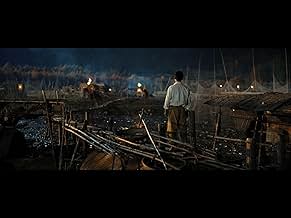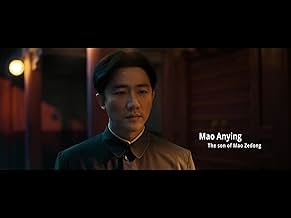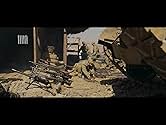IMDb RATING
5.5/10
4.6K
YOUR RATING
In the fierce battlefield in the midst of the harsh weather conditions, Wu Qian Li and Wu Wan Li, two brothers soldier including the brave Chinese soldiers must fight together and find a way... Read allIn the fierce battlefield in the midst of the harsh weather conditions, Wu Qian Li and Wu Wan Li, two brothers soldier including the brave Chinese soldiers must fight together and find a way to cope with the invasion of US forces.In the fierce battlefield in the midst of the harsh weather conditions, Wu Qian Li and Wu Wan Li, two brothers soldier including the brave Chinese soldiers must fight together and find a way to cope with the invasion of US forces.
- Awards
- 37 wins & 40 nominations total
Featured reviews
There are too many distinct inferior positions for chinese to respond the war,but if they make a concession,the war would have to be undertaken by their children.
Not a bad movie, a bit long but overall good.
PS: ignore the other reviews that give it a 1. I have seen so many 1 and 10 for a movie before. Bega me to think the 1 reviews are not objective about the movie, but personal feels.
PS: ignore the other reviews that give it a 1. I have seen so many 1 and 10 for a movie before. Bega me to think the 1 reviews are not objective about the movie, but personal feels.
All those 1-star review bombs are exposing the current climate of McCarthyist sinophobic hysteria in the west pretty accurately.
For anyone not suffering from McCarthyist hysteria, this is a decent movie with well-crafted, tense, and dramatic action scenes. It also does it's job of illustrating the theme of ordinary people being capable of extraordinary heroics feats and self-sacrifice when under existential threat.
Also, a good choice to feature Mao Anying's participation and death in the narrative. It showcases that the social class he was born in as Mao Zedong's son mattered nothing, because death is equal to all when fighting a war.
Less well done were the scenes of the American side. The directors and script writers did provide at least a couple of scenes of American soldiers talking about home life, and I thought this was a good choice to provide the American side with some humanity. But the actors were really chewing the scenery here, especially in their line delivery, which was unfortunate. I think, however, that this can mainly be attributed to the fact that these actors are far from being A-listers. Unfortunately, China still has not build up a decent pool of ethnically non-Asian quality actors, so I foresee more of this happening in the future.
Now a bit of historical context here on China's motives for partaking in this war: A few decades before the Korean War, China had been brutally invaded by imperial Japan through the Korean peninsula, which started off the theater of WW2 in the Far East. Given that this history was still fresh in the minds of the Chinese at the time, China was very sensitive to any happenings on the Korean peninsula. For that reason, they warned the American side multiple times not to cross the 38th parallel or they would force China's hand. The Americans thought the Chinese were bluffing and crossed that line anyway. This (and the American fleets that had gone to the Taiwan Straits in the summer of 1950) convinced the Chinese that the USA would try to invade and colonize China after taking control of the Korean peninsula. To preemptively stop this threat, China decided to set up the People's Volunteer Army to defend against the existential threat.
For anyone not suffering from McCarthyist hysteria, this is a decent movie with well-crafted, tense, and dramatic action scenes. It also does it's job of illustrating the theme of ordinary people being capable of extraordinary heroics feats and self-sacrifice when under existential threat.
Also, a good choice to feature Mao Anying's participation and death in the narrative. It showcases that the social class he was born in as Mao Zedong's son mattered nothing, because death is equal to all when fighting a war.
Less well done were the scenes of the American side. The directors and script writers did provide at least a couple of scenes of American soldiers talking about home life, and I thought this was a good choice to provide the American side with some humanity. But the actors were really chewing the scenery here, especially in their line delivery, which was unfortunate. I think, however, that this can mainly be attributed to the fact that these actors are far from being A-listers. Unfortunately, China still has not build up a decent pool of ethnically non-Asian quality actors, so I foresee more of this happening in the future.
Now a bit of historical context here on China's motives for partaking in this war: A few decades before the Korean War, China had been brutally invaded by imperial Japan through the Korean peninsula, which started off the theater of WW2 in the Far East. Given that this history was still fresh in the minds of the Chinese at the time, China was very sensitive to any happenings on the Korean peninsula. For that reason, they warned the American side multiple times not to cross the 38th parallel or they would force China's hand. The Americans thought the Chinese were bluffing and crossed that line anyway. This (and the American fleets that had gone to the Taiwan Straits in the summer of 1950) convinced the Chinese that the USA would try to invade and colonize China after taking control of the Korean peninsula. To preemptively stop this threat, China decided to set up the People's Volunteer Army to defend against the existential threat.
As a Chinese, I don't like this movie at all. This movie is kind of typical of Hollywood.
It's not a good movie to tell the history of the battle of Lake Changjin or the history of the war to resist U. S. aggression in Korea.
The movie didn't tell clearly that before Chinese army attended the war, the U. S. Navy's seventh Fleet had sailed into the Taiwan Strait on the orders of President Harry Truman. At that time, both Chinese government and Chinese people didn't want to attend a war again. But we have no choice.
The movie seems to blame MacArthur for all these faults. But at that time, the U. S. government itself also supported attacking NORTH Korea and even China. China warned the US not to cross the 38th parallel, but the government's leader Truman ignored it and thought China wouldn't send troops. These weren't made clear in the movie.
How the Chinese generals direct their soldiers to fight were not shown clearly in the movie. How the Chinese solders used wisdom and courage to defensed the tanks were not shown clearly in the movie either. They even let the main character use another tank to defense. That cannot be true.
Even at the end, the director arranged for American officers to salute the dead Bodies of Chinese soldiers. I'm not sure wether an ordinary soldier would do it, but I'm quite sure those who led the armies to attack Chinese People's Volunteers would not. It's really ridiculous.
The story about Lei was really great. He knew how to lead the soldiers to defense with wisdom, he knew to take advantage of the terrain, he also knew a soldier's sacrifice needs to be worth it. I cried when he died, especially when I heard the song of Yimeng. The Chinese sacrificed a lot in the war of liberation but now they need to fight again, to fight against the US army.
Who started the war first? Who amplified the war first? Who is invading? OF COURSE, not China.
Some people may think, the film is a propaganda tool for the Chinese government. This is ridiculous. This movie didn't even tell the history of the battle of Lake Changjin in a good way. Can it be propaganda? It wasn't nearly as much propaganda as Transformers, which showed off the U. S. military.
Do not assume every Chinese film as a propaganda tool, to be honest, the Chinese directors weren't good at propagating politics as American directors.
It's not a good movie to tell the history of the battle of Lake Changjin or the history of the war to resist U. S. aggression in Korea.
The movie didn't tell clearly that before Chinese army attended the war, the U. S. Navy's seventh Fleet had sailed into the Taiwan Strait on the orders of President Harry Truman. At that time, both Chinese government and Chinese people didn't want to attend a war again. But we have no choice.
The movie seems to blame MacArthur for all these faults. But at that time, the U. S. government itself also supported attacking NORTH Korea and even China. China warned the US not to cross the 38th parallel, but the government's leader Truman ignored it and thought China wouldn't send troops. These weren't made clear in the movie.
How the Chinese generals direct their soldiers to fight were not shown clearly in the movie. How the Chinese solders used wisdom and courage to defensed the tanks were not shown clearly in the movie either. They even let the main character use another tank to defense. That cannot be true.
Even at the end, the director arranged for American officers to salute the dead Bodies of Chinese soldiers. I'm not sure wether an ordinary soldier would do it, but I'm quite sure those who led the armies to attack Chinese People's Volunteers would not. It's really ridiculous.
The story about Lei was really great. He knew how to lead the soldiers to defense with wisdom, he knew to take advantage of the terrain, he also knew a soldier's sacrifice needs to be worth it. I cried when he died, especially when I heard the song of Yimeng. The Chinese sacrificed a lot in the war of liberation but now they need to fight again, to fight against the US army.
Who started the war first? Who amplified the war first? Who is invading? OF COURSE, not China.
Some people may think, the film is a propaganda tool for the Chinese government. This is ridiculous. This movie didn't even tell the history of the battle of Lake Changjin in a good way. Can it be propaganda? It wasn't nearly as much propaganda as Transformers, which showed off the U. S. military.
Do not assume every Chinese film as a propaganda tool, to be honest, the Chinese directors weren't good at propagating politics as American directors.
This is just an expensive imitation of the great war movies like Save Private Ryan. The problem is, unlike in Save Private Ryan, the Chinese directors and actors did not show the war as human tragedies, where countless young lives were lost. They presented the battles as glorious, heroic and patriotic acts. This just show the mindset of the Chinese elites nowadays.
The movie did not demonise the US troops. That's an improvement. However the US officers and soldiers characters are just like movie props, with little personalities or emotions. I don't know if this is because they can't get good US actors, or because they don't want US soldiers look more humane than the Chinese.
The movie showed the huge loss to the Chinese army only in numbers, when casualties were reported by the soldiers. But the fighting scene predominately shows US soldiers got blown up into the sky, with very few scenes showing Chinese soldiers getting killed. This is the same old practices of the Chinese war movies, showing how brave and effective killing machine the Chinese army is.
For the westerners who generally do not know what happened in Korean War, and what kind of soldiers were sent over to fight. Here is a fact to ponder: a large portion of Chinese POWs refused to go back to China and were sent to Taiwan.
The movie did not demonise the US troops. That's an improvement. However the US officers and soldiers characters are just like movie props, with little personalities or emotions. I don't know if this is because they can't get good US actors, or because they don't want US soldiers look more humane than the Chinese.
The movie showed the huge loss to the Chinese army only in numbers, when casualties were reported by the soldiers. But the fighting scene predominately shows US soldiers got blown up into the sky, with very few scenes showing Chinese soldiers getting killed. This is the same old practices of the Chinese war movies, showing how brave and effective killing machine the Chinese army is.
For the westerners who generally do not know what happened in Korean War, and what kind of soldiers were sent over to fight. Here is a fact to ponder: a large portion of Chinese POWs refused to go back to China and were sent to Taiwan.
Did you know
- TriviaUntil the last week of 2021, the highest-grossing film of the year and the highest-grossing film in Chinese cinema history as of 2021.
- ConnectionsFeatured in Zomergasten: Garrie van Pinxteren (2024)
- How long is The Battle at Lake Changjin?Powered by Alexa
Details
Box office
- Budget
- $200,000,000 (estimated)
- Gross US & Canada
- $342,411
- Opening weekend US & Canada
- $105,768
- Nov 21, 2021
- Gross worldwide
- $902,548,476
- Runtime2 hours 56 minutes
- Color
- Sound mix
- Aspect ratio
- 2.39 : 1
Contribute to this page
Suggest an edit or add missing content





































